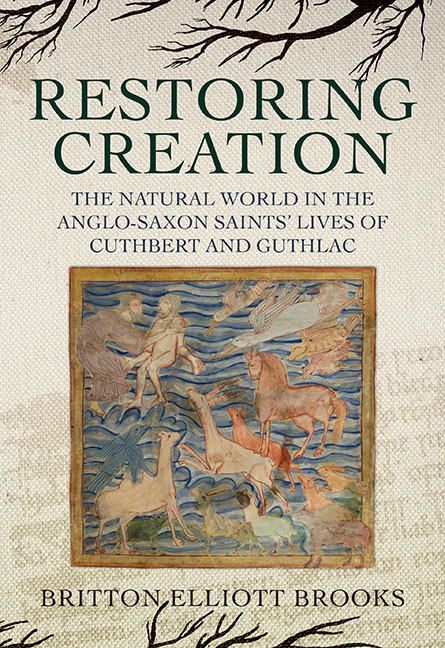 Restoring Creation: The Natural World in the Anglo-Saxon Saints' Lives of Cuthbert and Guthlac
Restoring Creation: The Natural World in the Anglo-Saxon Saints' Lives of Cuthbert and Guthlac Published online by Cambridge University Press: 18 September 2019
The date and context of the two Old English iterations of Guthlac's life discussed in this chapter, the Old English Prose Life of Guthlac (OEPG) and Guthlac A, have been the subject of much debate. The OEPG has proved difficult to date, and its author equally difficult to identify. This is in part due to the survival of the text in only two witnesses: the eleventh-century Cotton Vespasian D.xxi manuscript and, in abbreviated form, as the text now referred to as Homily XXIII in the late tenth-century Vercelli Book. On the basis of Anglian traits in the Vercelli version and other internal evidence, Jane Roberts and others have argued for a lost Anglian original composed between the late ninth and early tenth centuries. This chronological range is further supported by the text's descriptive landscape lexis which, as I explore below, is shared with boundary clauses of the mid tenth century. The OEPG is, on the whole, very faithful to its main source text, Felix's VSG. Gordon Whatley suggests the Old English author sought not only to provide a relatively complete, accurate, and often word-for-word translation, but also ‘through close imitation, to give the vernacular reader the illusion of reading the Latin text itself’. The author does, on occasion, streamline Felix's verbose Latin, however, as well as omit, amalgamate, or truncate various sections of the VSG which, as Whatley notes, ‘might have seemed redundant, repetitious or frivolous’. I build here on the work of Whatley and others in order to explore in detail how the OE author adapts the VSG to create a vernacular narrative centred on the physical landscape of Anglo-Saxon England with wider appeal and deeper focus than the Latin text.
The delicate strands of influence that shaped the Exeter Book poem Guthlac A have proved equally difficult to untangle. It is certainly indebted to Felix (however indirectly), as well as, potentially, other unattested Guthlac material resulting from the accretion of local legend. Roberts posits in her edition that various features point to ‘an earlier rather than later time of composition within the Anglo-Saxon period […] for Guthlac A’. Lexomic analysis, however, suggests that the poem belongs firmly in the English Benedictine Reform, which would place it in the mid- to late-tenth century.
To save this book to your Kindle, first ensure no-reply@cambridge.org is added to your Approved Personal Document E-mail List under your Personal Document Settings on the Manage Your Content and Devices page of your Amazon account. Then enter the ‘name’ part of your Kindle email address below. Find out more about saving to your Kindle.
Note you can select to save to either the @free.kindle.com or @kindle.com variations. ‘@free.kindle.com’ emails are free but can only be saved to your device when it is connected to wi-fi. ‘@kindle.com’ emails can be delivered even when you are not connected to wi-fi, but note that service fees apply.
Find out more about the Kindle Personal Document Service.
To save content items to your account, please confirm that you agree to abide by our usage policies. If this is the first time you use this feature, you will be asked to authorise Cambridge Core to connect with your account. Find out more about saving content to Dropbox.
To save content items to your account, please confirm that you agree to abide by our usage policies. If this is the first time you use this feature, you will be asked to authorise Cambridge Core to connect with your account. Find out more about saving content to Google Drive.